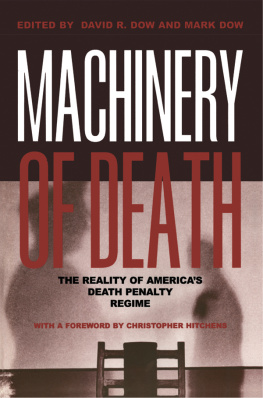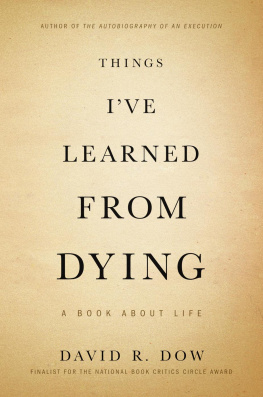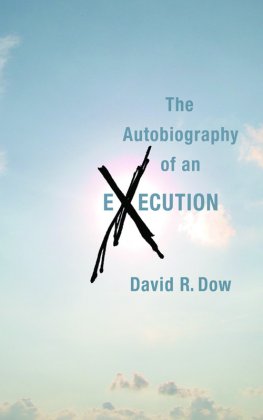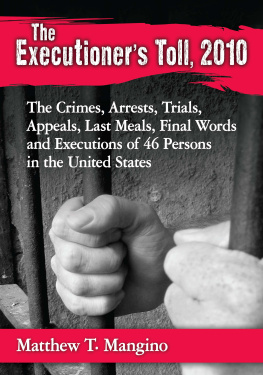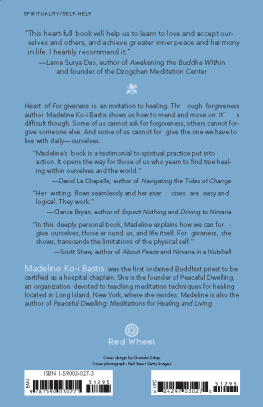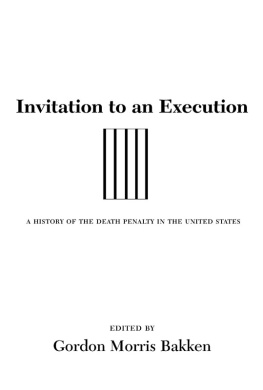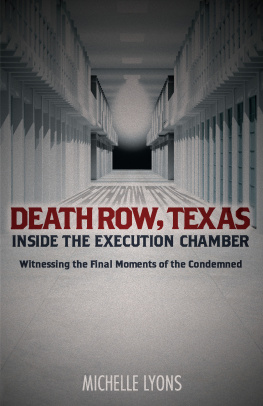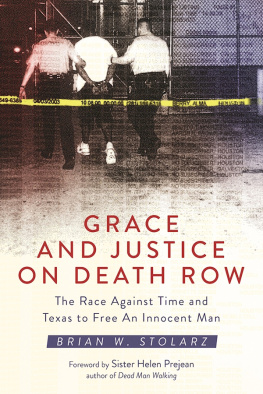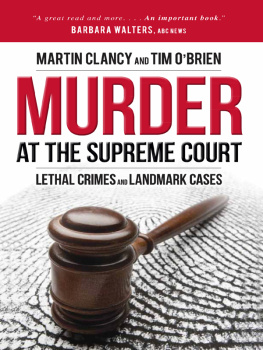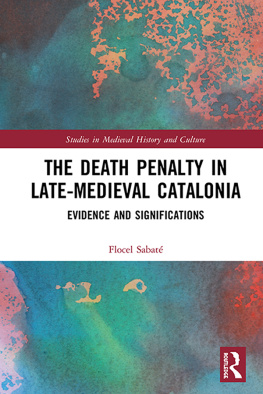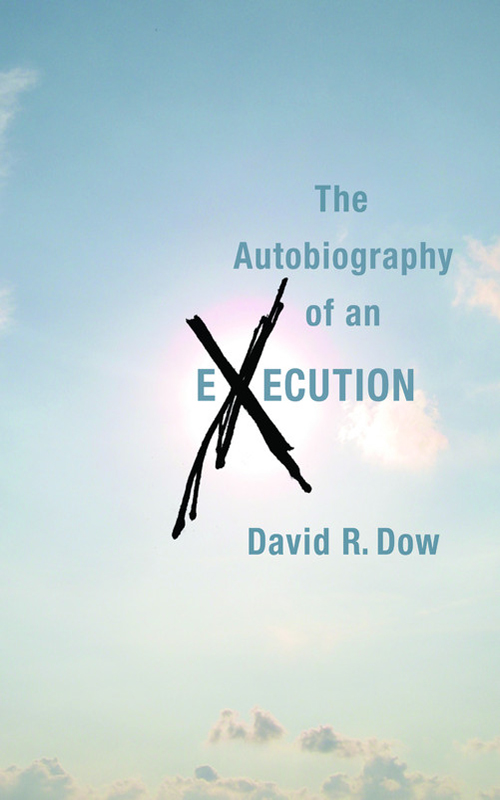Copyright 2010 by David R. Dow
All rights reserved. Except as permitted under the U.S. Copyright Act of 1976, no part of this publication may be reproduced, distributed, or transmitted in any form or by any means, or stored in a database or retrieval system, without the prior written permission of the publisher.
Twelve
Hachette Book Group
237 Park Avenue
New York, NY 10017
Visit our website at www.HachetteBookGroup.com.
www.twitter.com/grandcentralpub.
Twelve is an imprint of Grand Central Publishing.
The Twelve name and logo are trademarks of Hachette Book Group, Inc.
First eBook Edition: February 2010
ISBN: 978-0-446-57394-8
In Memory of Peter G.
Qu significa persistir en el callejn de la muerte?
P ABLO N ERUDA , El libro de las preguntas, LXII
He thought that in the history of the world it might even be that there was more punishment than crime but he took small comfort from it.
C ORMAC M C C ARTHY , The Road
I have been representing death-row inmates, mostly in Texas, since the late 1980s. The stories in this book are true. I was involved in all the cases I have described (although not always as the lead lawyer), and all the factual details are based on my own firsthand knowledge. I have not exaggerated to heighten drama.
In telling these stories, however, I have confronted constraints. A lawyers obligation to keep his clients secrets confidential remains even after the client has died. I have therefore changed many of the names, and I have altered many identifying details.
In addition to using pseudonyms, I have occasionally changed genders, ages, races, locations (including cities), dates, and restaurants. I have not altered the facts of the crimes nor of my relationships with my clients, but I have taken procedural details of some cases and attributed them to other cases. In some cases where there were multiple execution dates, I have told the story as if there was only one. I have transposed the geographical location of certain events (including where certain things took place inside the prison or jail, which county some crimes were committed in, and whether a legal proceeding took place in state or federal court), and Ive altered the timing of others, though the basic chronology of events is accurate.
I have also probably put some of Katyas words in my mouth, and vice versa. I recall many of our conversations with near-perfect clarity (although, as she will tell you, I forget many more), but I often recall what was said without remembering which one of us said it.
Scores of lawyers have worked on the cases I describe in the following pages. To avoid burdening the reader with a Shakespearean cast, I refer to only three of them, using pseudonyms, in the text. I list all their actual names in the Acknowledgments.
I have made the changes I did for many reasons: to protect attorney-client privilege, as I said, which survives even after the client dies; to avoid revealing confidential information of present and former clients; to protect the families of both murder victims and the criminals who killed them (even families of murderers are entitled to privacy and respect); to conceal the identities of people who would not want their help to me revealed (including guards, police officers, court personnel, judges, and prosecutors); to protect living clients from retaliation or jealousy; to compress into a two- or three-year period stories that in some cases lasted a decade or longer; and to tell the stories without getting too bogged down in legal and procedural details. I have endeavored to write an honest memoir without revealing confidences, so I have told these stories in a way that is faithful to the truth as well as to the individuals they feature.
I f you knew at precisely what time on exactly what day you were going to die, and that date arrived, and the hour and minute came and went, and you were not dead, would you be able to enjoy each additional second of your life, or would you be filled with dreadful anticipation that would turn relief into torture? That is the question I asked myself at twenty minutes past eight oclock on Halloween night. Jeremy Winston was still alive. He was in the holding cell, eight steps away from the execution chamber at the Walls Unit in Huntsville, Texas. He was supposed to have been dead for two hours.
Winston was my client. I was sitting in my office in Houston with three other lawyers, waiting for the clerks office at the United States Supreme Court to call. The warden at the Walls was holding a judicial order instructing him to execute Winston after 6:00 p.m. He would carry it out unless the Supreme Court intervened. Winston had been pacing for two hours in the tiny holding cell, three steps one way, three steps back. He had requested a cigarette in lieu of a final meal. Prison officials informed him that tobacco products were not permitted on prison grounds. But the three guards who would escort Winston to the gurney gave him a pack of cigarettes and one match. He lit each new cigarette with the dregs of the old one.
Our phone rang. The clerk at the Supreme Court wanted to know what time we would be filing additional papers. I hadnt planned to file anything else. The four of us working on the case had already written our best argument and sent it to the Court. It had been there since five oclock. In nearly twenty years of representing death-row inmates, this had never happened to me before. Was the clerk telling us to file something? I told him Id call right back.
Had a law clerk or even a Supreme Court justice seen some argument that we had missed and decided to hold the case a little bit longer, giving us more time for the lightbulb to click on? Thats what the justices do sometimes, they toy with you. Jerome, Gary, Kassie, and I were sitting in the conference room. We frantically deconstructed and reassembled our arguments, looking for something we might have missed. I was bouncing a Super Ball off the wall, tossing it with my left hand and catching the rebound with my right. Gary was juggling three beanbags. Jerome and Kassie were sitting still, pens in their hands, waiting to write something down, if we could think of something to write. Jeremy Winston was wondering why he was still alive. Suddenly I saw him, peering into the conference room, watching his lawyers juggle and play catch and sit there doing nothing. He shook his head, a gesture just short of disgust, realizing the sand was about to run out.
Maybe, I said, we had called something by the wrong name. You might think that when a life is at stake, formal legal rules would not matter so much, but you would be wrong. People die when their lawyers neglect to dot the is or cross the ts. I decided we would refile what we had already filed, and just call it something different. Because I couldnt think of any other explanation, I convinced myself the problem was with the title. Necessitys eldest child is invention; her second-born is rationalization. Garys the fastest typist. I asked him to get started working on it.
Two minutes later the phone rang again. Kassie answered. The clerk was calling to tell us never mind, that we had lost. I went into my office, closed the door, and called Winston to let him know. He was declared dead at twenty-seven minutes past nine.

I WALKED IN THE DOOR from the garage at nine fifty-five. I was sucking on a peppermint to hide that I had been smoking. A dried-out roasted chicken was sitting on the counter. A fly was on the drumstick. I shooed it away. An open bottle of red wine was next to the chicken. I called to my wife, Katya. There was no answer. I figured Lincoln had had a nightmare and she was upstairs with him. I started to climb the stairs. Katya called to me from the library. She was sitting on the sofa, her feet on the coffee table, holding a wineglass on her stomach. Her eyes were red. She had been crying.


